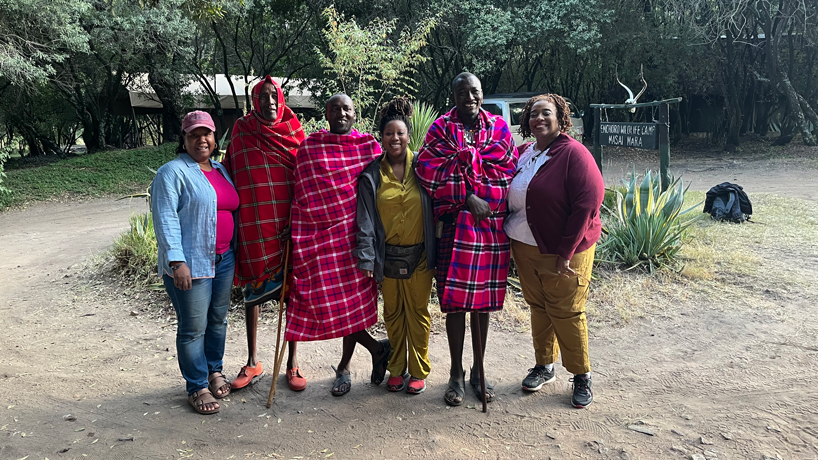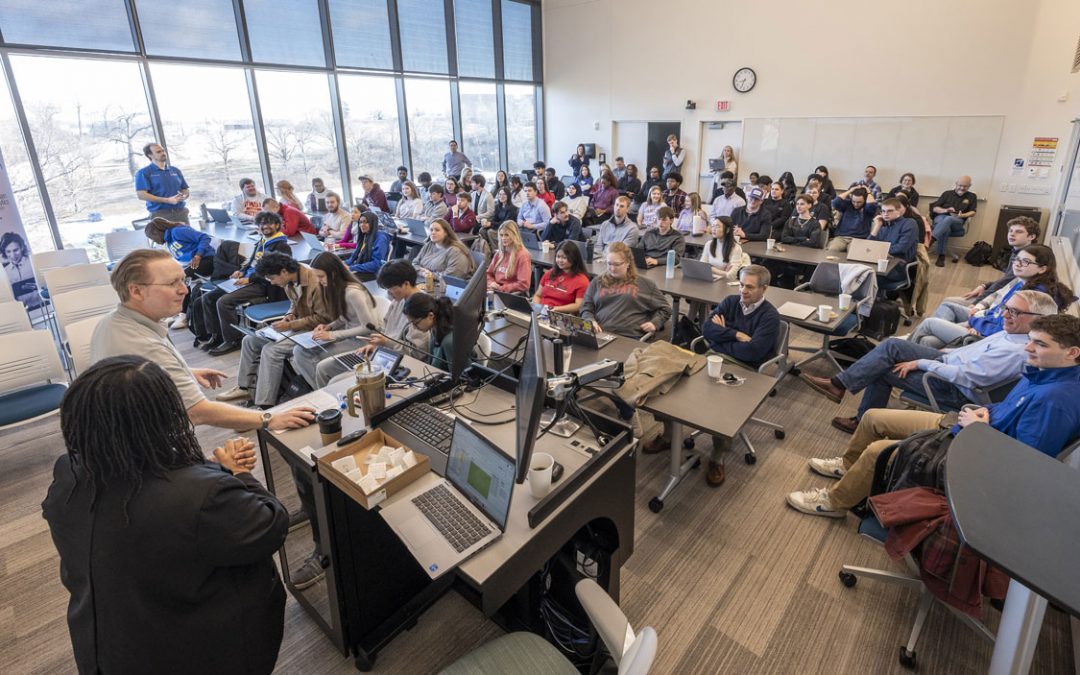
College of Education doctoral graduates Terry Daily-Davis (left), Javania Webb (center) and LaChrisa Crenshaw (right) stayed in a Masaai village on the Maasai Mara National Reserve before traveling to Kitale, Kenya, to lead professional development workshops and conduct research. (Photo courtesy of Javania Webb)
Before this summer, LaChrisa Crenshaw and Javania Webb had never visited anywhere in Africa. However, upon arriving in Kenya, they were struck by an overwhelming sense of belonging.
“A lot of the Kenyans were saying, ‘Welcome home,’” Crenshaw said. “I felt that was just very powerful for me to hear that. They made you feel welcome.”
Crenshaw and Webb, doctoral graduates of the College of Education at the University of Missouri–St. Louis, were welcomed as part of the Inquiry Initiative Summer Institute. They were part of a larger group that included UMSL faculty members and fellow doctoral graduate Terry Daily-Davis, who also serves as the assistant dean of the College of Arts and Sciences at Harris-Stowe State University.
The initiative was launched by Shea Kerkhoff, an assistant professor in the UMSL College of Education, in 2018. This summer marked Kerkhoff’s third year leading the program, which has worked collaboratively with Peter Wanyoni, founder and director of the Hope Education Centre in Kitale, Kenya, and Kenyan educators to support learner-centered, inquiry-based teaching.
This year, the team from UMSL led professional development workshops on selfcare for educators, collected data on learner-centered teaching and participated in a weekend children’s camp. Kerkhoff said the collaboration allows educators from both countries to compare practices and consider how they can benefit from different perspectives.
“I think it is always important for education to be contextualized,” Kerkhoff said. “Some of the fun is taking practices from Kenyan educators and thinking through, ‘How would that work here?’”
For Crenshaw and Webb, the trip represented more than a professional development opportunity. It was also a once-in-a-lifetime opportunity to connect with their ancestral roots as Black Americans, recenter themselves and experience the country’s renowned natural wonders.
An unexpected journey
Webb had always wanted to visit Africa and pursue a doctorate, having seen her aunt and wife earn terminal degrees. But she never imagined she could do both with UMSL. Her work in the social work and nonprofit fields eventually led her to the university and to become acquainted with Crenshaw.
Webb had previously earned a bachelor’s degree in sociology at South Illinois University Edwardsville and master’s degree in nonprofit administration at Lindenwood University and went on to found You Are Worthy, Incorporated – a nonprofit that provides mentorship and leadership opportunities for queer Black youth. She joined UMSL’s Education Entrepreneur in Residence program to support that endeavor.
At the time, Webb had planned to start her doctorate at another university, but through her experience in the Edpreneur program, she became interested in the College of Education’s doctoral programs. By that time, she had also become friends with Crenshaw while working at a nonprofit in 2015. Crenshaw previously earned a BSW at UMSL and MSW at Saint Louis University and had accumulated 30 years of experience in the social work field with organizations such as Alive & Well Communities, KIPP and the Urban League of Metropolitan St. Louis.
When a new doctoral cohort opened in 2018, they both applied and were admitted.
A rocky road to Kenya
The notion of traveling to Kenya began with Webb browsing UMSL Global’s study abroad website. She noticed Kerkhoff’s program and reached out, along with Crenshaw and Daily-Davis, to inquire about it.
In short order, the four discussed logistics, calculated budgets and wrote a grant to fund the expedition. The grant was approved, and, for the moment, it seemed like a dream come true. But their hopes were quickly dashed by the onset of the COVID-19 pandemic in spring 2020. Many international programs were canceled, including the one they had just meticulously planned for.
“We just thought it wasn’t going to happen because we didn’t know what was going to happen with the pandemic,” Webb said.
It was disappointing, but the students held out hope. This past spring, they contacted Kerkhoff again, and she worked with her colleagues in Kenya to make the third Inquiry Initiative Summer Institute possible.
However, they would face more unforeseen challenges along the way.
The day of departure, a torrential downpour in the Midwest set in motion an unfortunate series of events including: a canceled flight, a missed international connection and a group of checked bags routed to London.
A day behind and a 15-hour flight later, everyone arrived in Nairobi.
On safari
After touching down in Kenya, the group preceded immediately to their accommodations for a wildlife safari in the Maasai Mara National Reserve. Webb was simultaneously excited and apprehensive leaving the airport as buildings began to fade in the distance.
“As we’re driving up the mountain, I’m noticing there’s no high rises,” she said with a laugh. “I’m a city girl. I’m expecting there to be a hotel. I’m not seeing any of that.”
When they reached the Maasai village, instead of a hotel they found a tent, though one with a sink and a toilet. For Crenshaw, it began to dawn on her that the group was truly in the wilderness.
“There was nothing to stop the lion from being a lion,” she said.
That trepidation wasn’t eased when a shriek rang through the village at 2 a.m. It turned out to be a bush baby – not a lion – but it was no less frightening in the pitch black.
After the sun rose, the team piled into a jeep to observe the country’s famed wildlife including elephants, giraffes, lions and zebras as well as the majestic grasslands dotted with the region’s distinctive Acacia trees.
“It was beautiful,” Crenshaw said. “It took my breath away to see all of this land and one little lonely tree, standing in a space of pride and even arrogance as the only tree that could occupy that space.”
“A way out of no way”
Next, the group traveled to Kitale, where UMSL team members toured several schools and aided in the construction of a girl’s dormitory before participating in the children’s camp, professional development workshops and research.
The new dormitory will allow up to 80 girls, who are at risk of sexual abuse during the three-hour walk to school, to stay there overnight during the week. Crenshaw and Webb helped the construction crew mix mortar – water, concrete and sand – for cinder blocks. Webb also ventured onto the network of scaffolding made from trees to assist with the upper levels.
At every turn, she was impressed with the ingenuity on display.
“They figure it out,” she said. “They make a way out of no way. That was my biggest lesson from the construction site.”
At the children’s camp, UMSL team members led activities for local students, including book reading, coloring, jump rope and soccer. Crenshaw and Webb also distributed jump ropes and coloring books and crayons for the students to keep.
“How grateful they were to have their own coloring book that was a great lesson of gratitude,” Crenshaw said. “Sometimes we don’t always get to see the same in the States. It still comes out, but it may look a little different here. But there it was in an open and appreciative way that you could honestly see and feel.”
Recharging and respect
While meeting with Kenyan educators, Crenshaw led professional development workshops on selfcare, communicating to them that it’s difficult to “pour from an empty cup.”
“It’s important when you’re an educator because you’re taking care of other people,” Kerkhoff said.
Crenshaw took the lead presenting, while her colleagues helped further explain pieces of a “selfcare toolbox” to provide context to the idea. One such tool is a selfcare clock, which illustrated what educators can do with five, 10 or 30 minutes to take care of themselves. The session also touched on the benefits of mindfulness and meditation.
“Many teachers came up afterward and said, ‘I really needed this. I needed to hear this. I’m going to have to do better about taking care of me so I don’t burn out,’” Crenshaw said. “They seemed extremely appreciative for the information given to them. That was, I think, a big plus.”
The research component of the Inquiry Initiative Summer Institute involved UMSL team members conducting classroom observations at various grade levels. The overarching goal of the research was to identify if there was student-centered learning present in the classroom in addition to teacher-centered education.
Team members sat in on classes and recorded notes on a variety of teaching and learning practices including: classroom administration, discussion facilitation, lecturing, student engagement, individual thinking and problem solving and testing.
Though most of the classes appeared to lean toward teacher-centered practices, Crenshaw and Webb observed a demonstrable level of engagement and respect for teachers among students. They also saw teachers using a high level of rigor to develop critical thinking by asking many follow-up questions and guiding students through thought processes. Crenshaw noted that she gained an appreciation for the Kenyan educators’ commitment and “patience in action” in the classroom.
Inspired by the kindness and passion they saw during the Inquiry Initiative Summer Institute, Crenshaw and Webb aim to bring what they learned to their work – Crenshaw as executive director of the Youth and Family Center and Webb as a postdoctoral scholar at the University of California, Riverside, researching LGBTQ youth relationships.
“It gave me a hunger to want to go over there more,” Webb said. “Everything exceeded the intention that I set. So, for me, my goal is to continue to be able to travel and help implement changes in whatever country I go to and bring it back here.”














